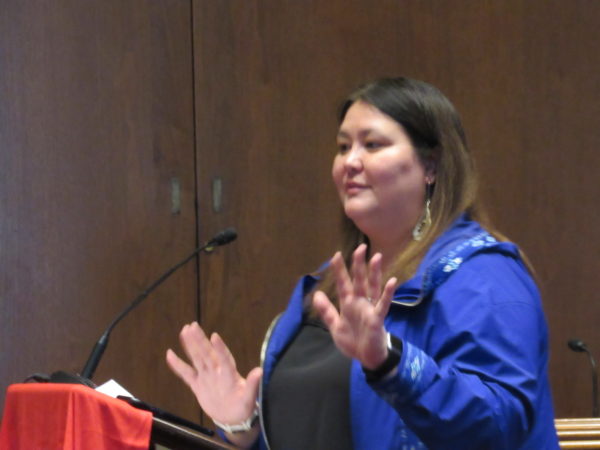
- Details
- By Native News Online Staff
WASHINGTON — A group of tribal chairmen from the Great Plains region has called for Alaska Native Tara Sweeney to be removed from her post as the Department of Interior’s Assistant Secretary - Indian Affairs, saying she “has lost the confidence of Indian tribes.”
The call for Sweeney’s removal follows news earlier this week that Alaska Native Corporations (ANC) would be eligible to receive some of the $8 billion in funding earmarked for tribes in the Coronavirus Aid, Relief, And Economic Security (CARES) Act. Prior to the announcement, tribal leaders and national advocacy organizations had pushed back against the notion that ANCs should be part of the funding.
In a six-page letter sent yesterday to Treasury Secretary Steven Mnuchin and Interior Secretary David L. Bernhardt, the Great Plains Tribal Chairmen’s Association (GPTCA) accused Sweeney of diverting emergency Tribal Government resources to state-chartered, for-profit corporations owned by Alaska Native shareholders, including Sweeney and her family. The GPTCA asked Mnuchin and Bernhardt to call upon President Trump to remove Sweeney from her job.
“She plans to divert billions of dollars of Coronavirus Relief funds to ANC for-profit state chartered corporations to the detriment of real Tribal Governments,” the chairmen write in the letter, which describes Sweeney’s alleged actions with some colorful language, calling it “a money grab”, “Machiavellian ministrations”, and an “end run of Indian Law.”
The GPTCA represents 16 tribes from North Dakota, South Dakota and Nebraska.
The U.S. Department of Treasury is the lead federal agency in deciding how to allocate the $8 billion of funding authorized by Title V of the CARES Act, but they are required to consult with the DOI and Tribes. Several tribal leaders who spoke on background with Native News Online voiced concern about Sweeney’s role in the Treasury Dept.’s decision to include Alaska Native Corporations in the mix for Title V funding.
 Tara Sweeney addresses National Congress of American Indians during the opening General Session in Denver, Colorado in October 2018. Native News Online photograph by Levi Rickert
Tara Sweeney addresses National Congress of American Indians during the opening General Session in Denver, Colorado in October 2018. Native News Online photograph by Levi Rickert
An Alaska Native, Sweeney is a former oil and gas lobbyist who later worked for one of Alaska’s largest native corporations, Arctic Slope Regional Corporation (ASRC). She was paid $1,086,675 by ASRC in 2017 and the first month of 2018, according to a federal financial disclosure report filed in January 2018 when she was being considered for the post as Asst. Secretary.
The Department of Interior denied the GPTCA’s allegations in a statement to Native News Online: “Assistant Secretary Sweeney is committed to supporting all American Indians and Alaska Natives, and to suggest she has personal motives or that she is attempting to divert funds away from American Indians is completely false,” DOI Spokesperson Conner Swanson said.
“Her approach has always been focused on inclusiveness, transparency and partnerships. It is unfortunate that during a time of historic appropriations for the Native American community, some are seeking to divide the community and are suggesting we ignore the mandate of Congress and exclude eligible entities as defined by law,” Swanson said.
Swanson pointed to voluntary “courtesy calls” that Sweeney hosted with the GPTCA, the National Congress of American Indians (NCAI) and the Native American Finance Officers Association (NAFOA) as examples of her effort to bring inclusiveness and build partnerships with tribes. The purpose of the calls was to explain the CARES Act process, answer questions and assist Tribes in navigating the Treasury Dept.’s web portal, he said.
Even so, tribal leaders have voiced concerns about the legality of including ANCs in the allocation of CARES funding as well as the amount that would be funneled to Alaska.
By some estimates, Alaska Native Villages and ANCs could claim up to half of the $8 billion allocated to the entirety of Indian Country under the CARES Act. By comparison, Alaska Natives represent about 1.6 percent of all Native Americans in the U.S. today.
The inclusion of ANCs in the CARES funding mix is “deeply troubling,” according to the National Indian Gaming Association, which represents about 150 tribal governments.
“Depending on the formula the Treasury uses and the factors contained therein, some estimates have Alaska Native Villages and ANC’s consuming up to $4 billion of the $8 billion allocated to Indian Country,” NIGA wrote in a letter Monday to Mnuchin, Bernhardt and Sweeney.
There are 13 regional ANCs and more than 200 Village ANCs, which are for-profit companies incorporated under state laws. Lands owned by ANCs are fee lands that are subject to state jurisdiction and state taxes. The ANCs are typically owned by older Alaska Natives who were granted shares or by younger Alaska Natives who received shares through bequest or transfer.
Alaska Native Corporations reported more than $10.5 billion in revenues in 2018 and employed approximately 15,000, according to the nonprofit Resource Development Council for Alaska, Inc., which represents companies from the state’s oil and gas, mining, forest products, tourism and fisheries industries.
In a letter to Mnuchin and Bernhardt, Sen. Tom Udall (D-N.M), vice-chairman of the U.S. Senate Committee on Indian Affairs, said the Coronavirus Relief Funds in question should go to Tribal governments of federally recognized Indian Tribes and “should not be diverted.”
“The U.S. government has specific trust and treaty responsibilities to American Indians and Alaska Natives. As with all provisions of the CARES Acts, implementation of [the CRF] requires respect for the inherent sovereignty of Indian Tribes and deference to Tribal views,” Udall notes.
One tribe, the Cheyenne River Sioux Tribe in South Dakota, has said it plans to file an injunction against the DOT and DOI to slow down the process and ensure the equitable distribution of funds to all of Indian Country.
"Tribes in the lower 48, especially those in the Great Plains Regions, have proven they will suffer more severe financial pressure due to the COVID-19 public health crisis than any Native Corporation in Alaska will," Cheyenne River Sioux Chairman Harold C. Frazier wrote in a letter to congressional members on Monday.
As the number of cases of COVID-19 in Indian Country soars past 1,000 and the death toll continues to climb, splitting the funds between tribal governments and ANCs seems at odds with the spirit of the legislation, said Cherokee Nation Principal Chief Chuck Hoskin Jr.
“It feels like a robbery is happening in broad daylight,” Hoskin said. “State-chartered Alaskan Native Corporations are poised for funds that were meant by Congress to extend a lifeline to tribal governments who are working day in and day out to provide essential health care, food distribution and other vital programs for our citizens through the COVID-19 pandemic. These funds are meant for tribes to get on their feet again and allowing these ANCs access to stimulus funds is at odds with the spirit of the $8 billion set aside for tribes.
“I think tribes will do everything we can to get justice.”
More Stories Like This
Native News Weekly (August 25, 2024): D.C. BriefsNavajo Nation Mourns the Passing of Former Vice President Rex Lee Jim
Deb Haaland Earns Endorsement From Communications Workers of America Local 7076
University Soccer Standout Leads by Example
Two Native Americans Named to Democratic Congressional Campaign Committee's“Red to Blue” Program
Help us defend tribal sovereignty.
At Native News Online, our mission is rooted in telling the stories that strengthen sovereignty and uplift Indigenous voices — not just at year’s end, but every single day.
Because of your generosity last year, we were able to keep our reporters on the ground in tribal communities, at national gatherings and in the halls of Congress — covering the issues that matter most to Indian Country: sovereignty, culture, education, health and economic opportunity.
That support sustained us through a tough year in 2025. Now, as we look to the year ahead, we need your help right now to ensure warrior journalism remains strong — reporting that defends tribal sovereignty, amplifies Native truth, and holds power accountable.
 The stakes couldn't be higher. Your support keeps Native voices heard, Native stories told and Native sovereignty defended.
The stakes couldn't be higher. Your support keeps Native voices heard, Native stories told and Native sovereignty defended.
Stand with Warrior Journalism today.
Levi Rickert (Potawatomi), Editor & Publisher

